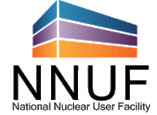High Temperature Facility

The open-access High Temperature Facility (HTF) was built and opened in 2016 using funding from The Department of Energy and Climate Change (now part of BEIS). The facility is focussed on the generation of high quality mechanical performance data for non-active structural materials used in Generation IV nuclear fission reactors, nuclear fusion reactors and non-nuclear high temperature applications. The HTF complements the existing Second and Third generation high temperature water and gas testing facilities at Birchwood. The Generation IV fission reactor technologies include: Sodium-cooled Fast Reactor (SFR); High Temperature Gas-cooled Reactor (GFR); Lead-cooled Fast Reactor (LFR); Supercritical Water-cooled Reactor (SCWR); Molten Salt Reactor (MSR) and the Very High Temperature Reactor (VHTR).
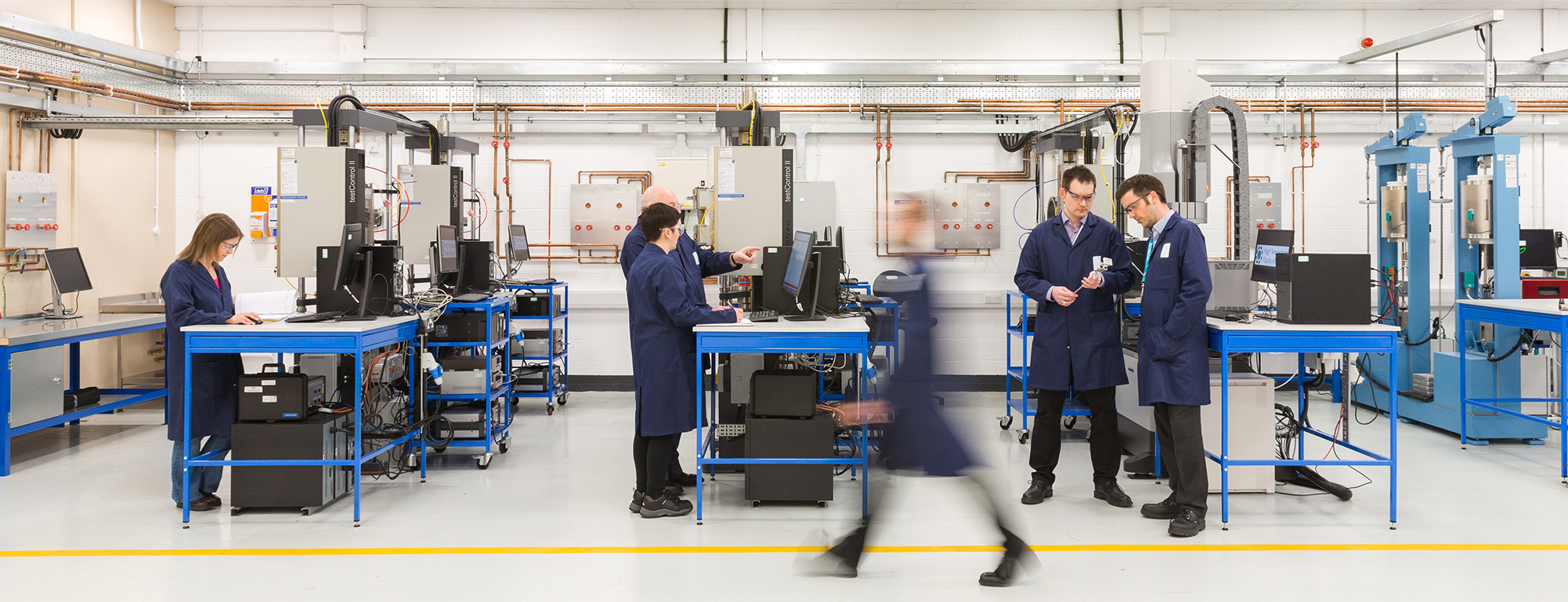
Creep/fatigue and creep test stations
© Jacobs
The HTF will enable new understanding of the structural performance of materials to be pioneered, the environmental interactions with reactor coolants to be studied, predictive models to be developed, and new data to be generated that will underpin the selection, manufacture and performance of advanced materials for future electricity generation technology.
The facility is located at Birchwood, Warrington, UK within the Jacobs laboratory complex, and is managed by Jacobs.
The HTF provides open access to research organisations looking to investigate, develop and advance structural materials technology for future systems applications such as Generation IV nuclear fission, nuclear fusion, advanced gas turbine materials and other advanced energy concepts.
The HTF provides:
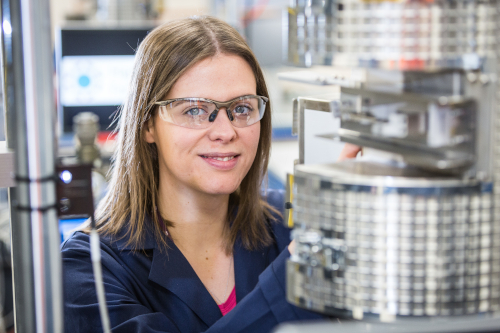
© Jacobs
• the in-depth knowledge of advanced nuclear fission systems design, manufacture, operation and regulation needed to align R&D programmes to establish the innovative experimental rigs required to address priority research challenges.
• a track record in internationally leading R&D in both conventional water-cooled reactors and high temperature fission systems, including both Advanced Gas-cooled Reactors (AGRs) and Fast Reactors. Jacobs are engaged with a number of international programmes (including representing the UK on the Generation IV International Forum) to ensure the current capability in high temperature materials is aligned with future reactor systems, and engages early within international programmes.
• experience of solving problems across the Technology Readiness Level (TRL) scale and helping partners to meet regulatory compliance.
• the quality systems in place to undertake evaluations under UKAS accreditation, if required, providing data suitable for the highest structural integrity requirements, e.g. assessment or design of nuclear structurally critical components.
• knowledge and experience of high temperature materials, structural integrity testing, material damage mechanisms and conducting materials testing in novel, demanding environments.
• an opportunity for academic institutions to collaborate to undertake research on structural materials for safety-critical industries, through potential proposals to EPSRC and other funding bodies (including the NNUF funded user access scheme).
Testing capabilities
The HTF currently offers rigs capable of testing materials at temperatures up to 1000°C (higher in some circumstances), and with temperature cycling in a range of novel, demanding environments (pressurised gas for VHTR/HTR, liquid metal for SFR/LFR, inert atmospheres). Recent projects have involved fatigue and creep fatigue testing of austenitic stainless steel in liquid lead (Pb) at 600°C and fracture testing of pressure vessel steels.
We have the capacity and expertise to incorporate specialised, bespoke equipment into tests to allow the construction of innovative experimental configurations for research organisations. All of the HTF equipment is held within a temperature- and humidity-controlled laboratory, to maximise data stability over long-term tests.
The HTF team includes engineers, materials scientists, chemists and structural integrity specialists, who can help research organisations to interpret test data and design solutions to the most complex problems.
The testing offered by the HTF includes, but is not limited to:
• Tensile testing (loads up to 100 kN in tension and compression)
• Fracture testing (loads up to 250 kN and in the temperature range -196ºC to 1000°C)
• Creep strain / rupture (loads up to 30 kN)
• Impression creep testing (deadweight-loaded)
• Creep crack growth (loads up to 30 kN)
• Strain and load-controlled low cycle fatigue initiation (loads up to 100 kN in tension and compression)
• Fatigue crack growth (loads up to 100 kN in tension and compression)
• Creep-fatigue initiation / growth (loads up to 100 kN in tension and compression)
• Thermo-mechanical fatigue initiation / growth (loads up to 100 kN in tension and compression)
• Miniaturised tensile / creep / fatigue testing (loads up to 10 kN)
• High cycle fatigue endurance / crack growth (up to 100 Hz test frequency and loads up to 10 kN).
To enable detailed analysis of tests, the rigs can be equipped with the following analytical instrumentation:
• Digital image correlation (DIC) for full field strain measurement (especially useful where welds are present), including microscopic capability
• Acoustic emission monitoring equipment for monitoring crack initiation and propagation
• Potential difference monitoring equipment for monitoring crack initiation and crack growth.
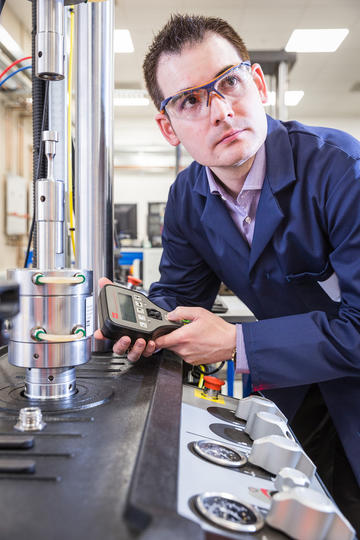
Set-up of a servo-hydraulic fatigue test station
© Jacobs
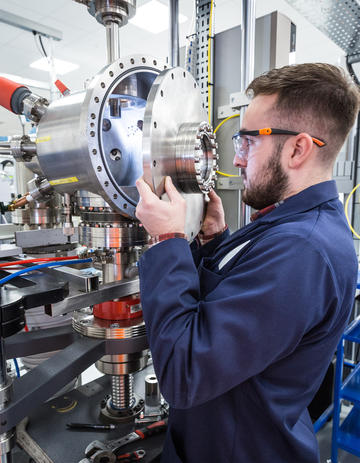
Assembly of a vacuum system onto a creep/fatigue test station
© Jacobs
Operation
The laboratory is an open-access facility, but Jacobs are responsible for the safety of all staff (including those from external organisations). As a result of this responsibility, Jacobs will provide the necessary training to staff from external organisations prior to commencement of work. Various operating models can be offered, including:
- testing to be conducted by Jacobs staff
- testing to be witnessed by partner organisations
- testing to be undertaken by partner organisations.
Contact
Please feel free to get in touch for exploratory discussions about how HTF can help deliver your requirements. We would be delighted to discuss your testing requirements and work with you to design and implement cost-effective, innovative solutions.
We invite organisations interested in using the facility to submit research proposals via email to:
High Temperature Facility (Amentum)
-
Mark Chatterton mark.chatterton@global.amentum.com
-
Andrew Wisbey andrew.wisbey@global.amentum.com
-
Mark Callaghan mark.callaghan3@global.amentum.com
-
Lee Waterhouse lee.waterhouse@global.amentum.com
Telephone:
+44 (0) 1925 462842 (MC)
+44 (0) 1925 462721 (AW)
+44 (0) 1925 462703 (JS)
Please also consult www.htfalliance.com for further information.
Availability
The HTF is fully open and welcomes visitors. Safety is of paramount importance and so we require staff and visitors to conform with our safe operating practices and a culture of care for each other, especially whilst in the laboratories. We encourage safety issues to be highlighted to staff to enable a continued improvement. Do contact HTF to discuss your needs and the exact nature of your requirements, to enable us to determine the feasibility and timescales for such activities.
© Jacobs
